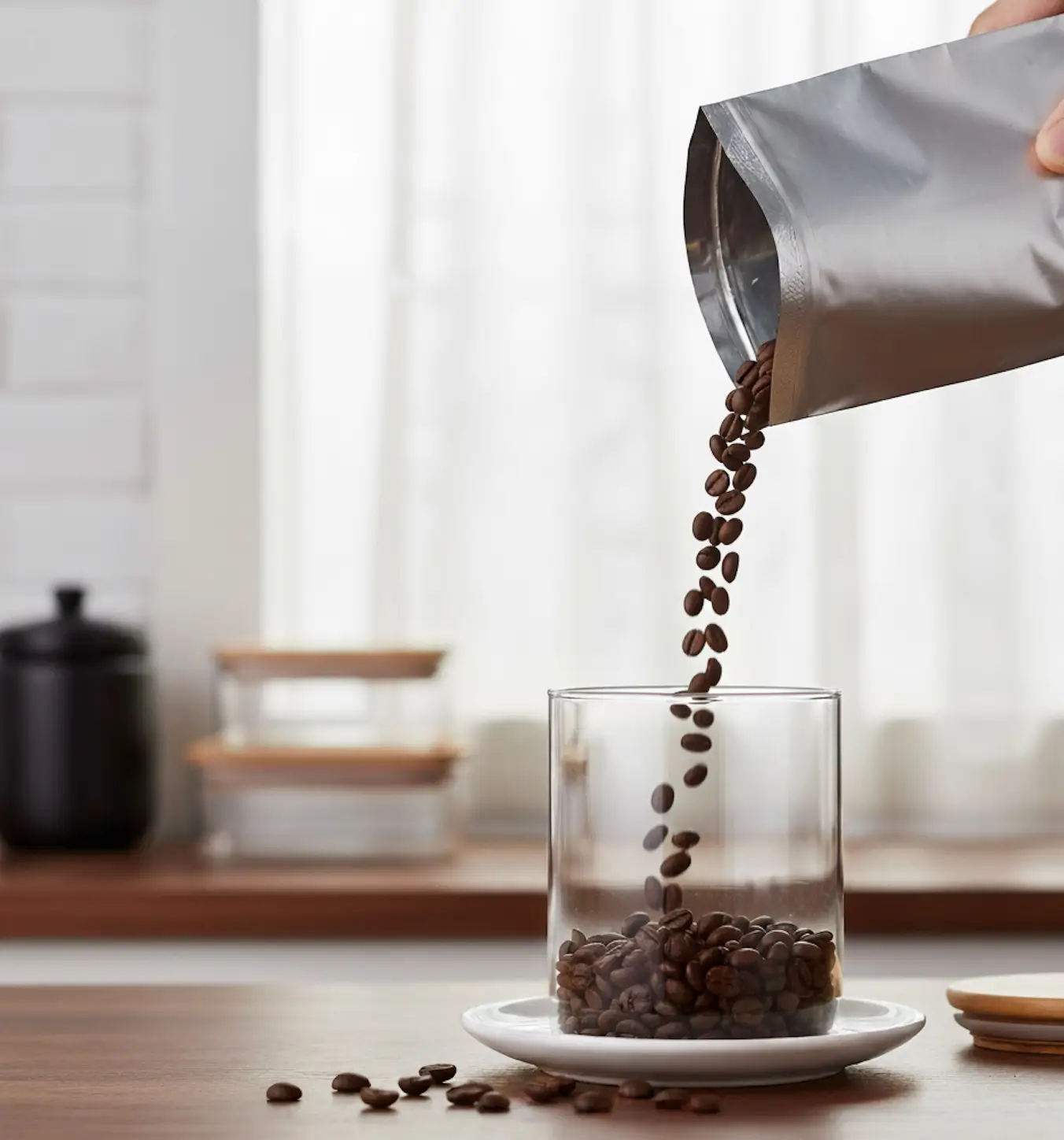Ever brewed a cup of coffee only to find it tastes flat, stale, or just not as vibrant as you remember? That disappointing experience usually comes from storing your beans incorrectly. To keep those delicate flavors and aromas, you need to know the best way to store coffee beans. If you don’t store them right, certain elements attack your beans, making them lose their wonderful taste and giving you a much less enjoyable cup. I’m going to give you practical solutions and insights into how to store your whole coffee beans perfectly. You’ll ensure every cup is as fresh and delicious as it should be, and properly stored beans really do make your whole brewing process better.
- What are the four enemies that degrade your coffee beans?
- What are the pillars of perfect coffee bean storage?
- What are the best coffee storage containers to choose?
- Should you refrigerate or freeze coffee beans?
- What are advanced tips for maximum coffee freshness?
- How long do coffee beans stay fresh? (A shelf life guide)
- What common coffee storage mistakes should you avoid?
- What is the secret to consistently great coffee?
What are the four enemies that degrade your coffee beans?
Four main enemies cause coffee beans to lose their quality: air (oxygen), light (especially UV), heat, and moisture (humidity). Each one actively strips your beans of their desirable characteristics, turning vibrant flavors into a dull, stale experience. Knowing these enemies helps you keep your coffee fresh.
- Air (oxygen) degrades whole coffee beans: Air contains oxygen, which starts a process called oxidation. This chemical reaction breaks down the flavorful oils and volatile aromatic compounds in the coffee bean. As oxidation continues, your coffee develops stale flavors, losing its distinct taste and aroma.
- Light (especially UV) harms whole coffee beans: Light, particularly ultraviolet (UV) rays, quickly breaks down the delicate, flavorful oils in coffee beans. This speeds up how fast the beans lose quality and go stale. Keeping your beans away from direct light is essential.
- Heat impacts coffee bean quality: High temperatures greatly speed up chemical reactions inside the coffee beans, causing their oils to go rancid much faster. This heat exposure makes your brewed coffee taste bitter and unpleasant. You absolutely must avoid storing beans near any heat sources.
- Moisture (humidity) affects coffee beans: Too much humidity introduces unwanted moisture into coffee beans. They naturally absorb moisture and odors from their surroundings. This absorption can lead to mold and a big loss of flavor, creating a bland or off-tasting brew.
What are the pillars of perfect coffee bean storage?
Perfect coffee bean storage means creating specific environmental conditions that directly fight those four enemies of freshness. These conditions protect your whole coffee beans from going bad, preserving their unique flavor and aroma longer. Getting these conditions right is central to finding the best way to store coffee beans.
What is the ideal temperature range for storing coffee beans?
The ideal temperature range for storing whole coffee beans is a cool, steady environment, usually between 15°C to 21°C (59°F to 70°F). This cool temperature keeps the flavorful oils from breaking down quickly and slows the staling process. You really want to avoid big temperature swings, as these can cause condensation and further damage your beans.
How important is maintaining low humidity for coffee beans?
Maintaining low humidity is incredibly important for keeping coffee beans fresh, ideally around 60% relative humidity. Too much moisture absorption makes them lose flavor and can encourage mold to grow in the beans. Remember, coffee beans absorb moisture easily from their surroundings, which just dilutes their natural flavors.
What is the importance of darkness when storing whole coffee beans?
Storing whole coffee beans in darkness is crucial to stop flavors from breaking down fast. Light, especially UV rays, actively destroys the aromatic compounds and oils that give coffee its distinct taste. That’s why you need to keep beans in a dark place, away from direct sunlight and bright artificial light, meaning you’ll need opaque containers.
How does airtight protection from oxygen preserve whole coffee beans?
Airtight protection from oxygen plays the most crucial role in preserving whole coffee beans by preventing oxidation. An airtight container stops oxygen from getting to the beans, minimizing the chemical reactions that cause stale flavor. Truly airtight containers offer much better protection than standard coffee bags, even those with one-way valves, which can still let some air in over time.
What are the best coffee storage containers to choose?
Choosing the right coffee storage containers is essential for storing your coffee beans the best way. Good containers create a barrier against the enemies of freshness: air, light, heat, and moisture. They are a critical tool in keeping your coffee fresh.
What key features should you look for in a coffee container?
You should look for specific features in a coffee container to keep your beans at their best. The container must be airtight to prevent oxygen exposure, and it needs to be opaque to block harmful light. Also, the material should be non-porous, like stainless steel, ceramic, or opaque glass. These materials won’t absorb or give off flavors to your beans.
What are the recommended container types for optimal coffee freshness?
Several container types are highly recommended for keeping your coffee as fresh as possible and are considered the best way to store coffee beans. Containers like Airscape or Atmos are particularly good because they actually remove air from the storage chamber. High-quality stainless steel or ceramic options with tight-sealing lids also offer excellent protection.
- Airscape containers: These clever containers have a patented inner lid that pushes out air, creating a vacuum seal above the beans. This design minimizes oxygen exposure and works very well to keep coffee fresh.
- Atmos containers: Like Airscape, Atmos containers use a twist mechanism to remove air, creating a vacuum seal. They offer superior protection against oxidation and are a popular choice for serious coffee drinkers.
- Opaque ceramic jars: Good quality ceramic jars with silicone-sealed lids offer both darkness and airtightness. They look nice and effectively block light and air.
- Stainless steel canisters: These sturdy canisters block light well and often come with airtight clamp-down lids. Stainless steel is a non-reactive material, so it won’t give any flavors to your beans.
What containers should you avoid for coffee storage?
You should avoid certain containers for coffee storage because they don’t protect your beans from environmental damage. Clear containers, like standard glass jars, expose beans to light, which quickly degrades flavor. Ordinary plastic bags and most original coffee packaging are also not good because they are often not truly airtight, allowing air exposure that makes your coffee stale.
Should you refrigerate or freeze coffee beans?
Whether you should refrigerate or freeze coffee beans depends entirely on how long you need to store them, but each method has its own issues. For daily use, putting beans in the refrigerator is generally not a good idea, while freezing can work for long-term preservation if you do it correctly. The best way to store coffee beans usually involves understanding these differences.
Why is refrigeration generally a bad idea for daily coffee bean storage?
Refrigeration is generally a bad idea and I truly don’t recommend it for daily storage of whole coffee beans. Coffee is very hygroscopic, meaning it easily attracts and absorbs moisture from its surroundings. A refrigerator has ambient moisture and many food odors inside, which your beans will quickly soak up, leading to a big loss of flavor. Plus, repeatedly moving beans between a cold refrigerator and warmer room temperature causes condensation to form on their surface. This introduces unwanted moisture that speeds up staling and can damage extraction quality when you brew.
When and how should you properly freeze coffee beans for long-term storage?
You can properly freeze whole coffee beans to extend their shelf life for long-term storage, but only if you follow specific conditions. Freezing slows down the oxidation process, preserving those volatile aroma compounds very well. You must use truly airtight containers, such as vacuum-sealed bags or specific freezer-safe coffee storage containers, to prevent freezer burn and moisture absorption. It’s best to freeze beans in small, single-use portions. This way you avoid repeated thawing and refreezing, which causes harmful condensation. This method works especially well for preserving larger quantities of specialty coffee or when you want to keep them fresh for several months.
What is the everyday solution for room temperature coffee bean storage?
For daily use, storing your coffee at room temperature in an airtight, opaque container placed in a cool, dark spot is the best way to store coffee beans. This method gives you the necessary protection from light, air, and too much heat, while also avoiding the moisture and odor problems that come with refrigeration. Just keep the container in a pantry or cupboard, away from direct sunlight or hot appliances.
| Storage Method | Pros | Cons | Best Use Case |
|---|---|---|---|
| Refrigeration | Slightly slows aging | Absorbs moisture & odors, condensation risk, flavor degradation | Generally discouraged |
| Freezing | Extends freshness for months (up to 6) | Requires airtight containers, careful handling, avoid repeated thawing | Long-term storage, specialty coffee |
| Room Temperature | Preserves flavor if stored properly | Shorter shelf life (2-4 weeks opened) | Daily use, quick turnover |
What are advanced tips for maximum coffee freshness?
Beyond the basics, a few advanced tips can help you achieve maximum freshness for your coffee, ensuring an exceptional brewing experience every time. Doing these things complements proper storage, cementing the best way to store coffee beans. These tips really focus on minimizing exposure to the enemies of freshness.
Why should you buy whole beans and grind on demand?
You should always buy whole coffee beans and grind them right before brewing because ground coffee loses freshness much, much faster. Grinding vastly increases the surface area of the coffee exposed to air, speeding up oxidation and the loss of those precious flavors and aromas. Grinding on demand keeps these volatile compounds until the moment you brew.
How do mindful quantity purchases impact coffee freshness?
Buying coffee in mindful quantities directly affects how fresh your coffee stays by minimizing the time your beans spend exposed to the air once opened. I recommend buying whole coffee beans in smaller amounts that you know you’ll use within 2 to 4 weeks. This approach makes sure you always have fresh beans for brewing, stopping your supply from going stale before you finish it.
Why should you keep coffee beans away from strong odors?
You should keep coffee beans away from strong odors because coffee absorbs smells so easily. Since they are hygroscopic, beans will readily soak up any pungent smells from nearby foods like spices, garlic, or onions. This absorption can give your coffee unwanted, off-flavors, ruining its natural profile.
Should you consider nitrogen-flushed packaging for coffee beans?
You should consider nitrogen-flushed packaging for extending the unopened shelf life of coffee beans. This type of packaging replaces the oxygen inside the bag with inert nitrogen gas. Without oxygen, oxidation slows down a lot, preserving the coffee’s freshness for a much longer time until you actually open the package.
How long do coffee beans stay fresh? (A shelf life guide)
Understanding how long coffee beans stay fresh under different conditions helps you manage your supply and guarantees the best flavor. The coffee bean shelf life changes a lot depending on if beans are opened, unopened, or frozen, and whether they are whole or ground. Knowing this supports the best way to store coffee beans.
How long do unopened whole coffee beans stay fresh?
Unopened whole coffee beans can stay fresh for up to 12 months if you store them correctly. This means keeping them in their original sealed, preferably nitrogen-flushed, packaging in a cool, dark, and dry place. The factory seal and protective atmosphere really make them last longer.
What is the shelf life of opened whole coffee beans?
The shelf life of opened whole coffee beans is much shorter. For the best flavor and aroma, you should use them within 2 to 4 weeks. Once exposed to air, the oxidation process begins, and the beans will start to lose their volatile compounds. Proper storage in an airtight container helps you get the most out of this limited window.
How long do frozen whole coffee beans maintain freshness?
Frozen whole coffee beans, if stored properly in truly airtight and preferably vacuum-sealed packaging, can stay fresh for up to 6 months. Freezing slows down the chemical reactions that cause staling, preserving the beans’ integrity for a longer time. It’s important to thaw only what you need to avoid repeated temperature changes.
How does ground coffee’s shelf life compare to whole coffee beans?
Ground coffee has a much shorter shelf life compared to whole coffee beans, typically staying freshest for only 1 to 2 weeks. The increased surface area of ground coffee greatly speeds up oxidation and the escape of aromatic compounds. This quick degradation really drives home the advice to grind your coffee beans just before brewing.
| Coffee Type & Condition | Optimal Shelf Life | Key Storage Factor |
|---|---|---|
| Unopened Whole Beans | Up to 12 months | Sealed, cool, dark, dry |
| Opened Whole Beans | 2 to 4 weeks | Airtight, opaque container |
| Frozen Whole Beans | Up to 6 months | Truly airtight containers (vacuum-sealed) |
| Ground Coffee | 1 to 2 weeks | Increased surface area, rapid oxidation |
What common coffee storage mistakes should you avoid?
You should avoid several common coffee storage mistakes to stop rapid degradation and make sure your coffee stays fresh and flavorful. Spotting and correcting these habits is central to mastering the best way to store coffee beans. These errors often expose your beans to their main enemies: air, light, heat, and moisture.
- Storing in clear containers: Clear containers expose your coffee beans to light, which breaks down delicate oils and makes flavors disappear faster. Always choose opaque containers.
- Keeping beans in original bags or plastic: Most original packaging and standard plastic bags aren’t truly airtight. They let air in, leading to rapid oxidation and stale coffee.
- Placing near heat sources or direct sunlight: Heat from appliances or direct sunlight dramatically speeds up the chemical reactions that make beans go rancid. Store beans in a cool, dark place.
- Refrigerating for daily use: Refrigeration introduces moisture and foreign odors, which coffee beans easily absorb. This leads to dull flavors and potential condensation problems.
- Freezing without proper airtight sealing: Freezing incorrectly can cause freezer burn and moisture damage, negatively affecting your bean’s quality. Always use truly airtight, preferably vacuum-sealed, containers for freezing.
- Buying in bulk without a consumption plan: Buying too much coffee without a clear plan means your beans might go stale before you can use them, especially once you open the bag. Buy smaller batches or freeze properly portioned amounts.
- Pre-grinding all beans in advance: Ground coffee has a much larger surface area, making it very prone to rapid oxidation and loss of volatile aromas. Grind only what you need, right before brewing.
- Storing near strong-smelling foods: Coffee absorbs odors easily. Keeping beans next to pungent foods like spices or onions can infuse them with unwanted flavors.
What is the secret to consistently great coffee?
The secret to consistently great coffee lies in understanding and diligently applying the principles of proper bean storage. The best way to store coffee beans means a focused effort to protect them from their four primary enemies: air, light, heat, and moisture. By following these guidelines, you preserve the intricate flavors and aromatic compounds that make coffee such a delightful drink. Using airtight, opaque containers in a cool, dark place forms the foundation of good storage. Always remember to prioritize grinding fresh, whole coffee beans right before you brew your cup. This practice ensures maximum coffee freshness and flavor in every single sip.









